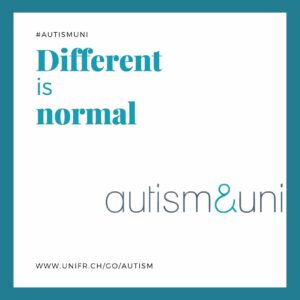Life at university is largely shaped by university peers. What exactly is their role?
Context
When people with autism talk about people without autism, they refer to them as “neurotypicals”. By this, they mean people who function according to a certain typicality, or at least outside the spectrum. However, this very typicality is being questioned today, in favour of highlighting the individuality of each person. To sum up, we could say that today, difference has become normality.
Life at university is punctuated by classes and exams, but also by social life. Indeed, much of the interaction with fellow students takes place outside of class time. For students on the autism spectrum, this social proximity can be difficult to manage. In academic life, student peers have an important role to play.
Until recently, it was difficult for many people to even consider the possibility that people with autism could walk through the doors of a university. Today it is not only known to be possible, but also valued.
Today, as explained in the chapter for teaching and administrative staff, teaching methods are diversifying and the varieties of cognitive profiles are being emphasized. It is realised that innovation can be further supported by mixing ways of thinking and conceptualising. Young students are gaining confidence in this dynamic, becoming more prepared to have assertive convictions and critical thinking.
What does that have to do with me?
Since the proportion of students with autism is estimated to be between 0.3 and 0.6 percent of the student body, the likelihood of a “neurotypical” student meeting a student with autism is significant.
The role of peers at the University is no longer in question. This role is no longer seen as “support”, but more as a mutual enrichement.
Below you will find some tips for interacting with your peers with autism. The truth is that the tips offered are applicable and enjoyable for most people, and that is what the world of autism teaches us.
Peer mentoring
At the international level, some peer mentoring programmes have already been set up. In Fribourg, the first steps in this direction were taken in autumn 2021. Regular meetings can already help students on the autism spectrum to maintain their self-confidence. For the neurotypical peer, this connection allows them to learn organized functioning and structured communication. Moreover, such an approach is supervised by a professional from the Autism&Uni team and allows the student to gain a lot of directly applied knowledge.
What is the next step?
Is there a person on the autism spectrum in your class and do you feel adequately informed?
Practical advice
- If you feel a certain distance from your autistic peers, get informed: knowledge will ease your fears
- Your peer on the autism spectrum may keep his or her distance during certain social times, such as lunch or between classes. If this makes you uncomfortable, ask. Chances are, he or she just needs a moment of sensory and social calm to regain strength.
- Group work is difficult for all students. Here are some tips to help you get through it:
- Before you begin, describe your strengths and weaknesses in relation to the skills you need to bring to the job.
- Ask your colleagues to do the same
- Divide the work to build on strengths and reduce difficulties
- Agree on a common philosophy of constructive criticism
- Break down the work into separate and correct parts for each
- Agree on milestones to achieve the goal and intermediary deadlines for your personal work as steps towards these milestones
- Agree on a meeting schedule
- Stick to your commitments
- For communication, avoid innuendo, unspoken words or facial expressions, ambiguous language such as figures of speech, wordplay, or irony
- Be clear and explicit in your requests
- A person with autism can tire quickly when in a group or noisy environment. Be careful not to talk too much
- Your autistic peer may make very clever connections between two subjects without making the connection clear: be interested, you will be pleasantly surprised to understand the connection
- If you have any questions, please do not hesitate to contact the Autism&Uni team
Questions to ask yourself
- Is there a person on the autism spectrum (or do you suspect there is one) in your class?
- Do you feel sufficiently informed?
- Would you dare to contact the Autism&Uni team to ask questions?
- What do you remember about communicating with a person with autism?
- What is your relationship to diversity?
Additional information
The students of the Autism 2021 course have prepared a series of podcasts to raise awareness of the world of autism. Thanks to them!
To move forward, we must dare to ask questions. Do not hesitate to contact the Autism&Uni team and to follow us on social networks.
CONTACTAbout the author
Edited by: Nathalie Quartenoud ©
Translated by: Daniel Dukes


 Back
Back 